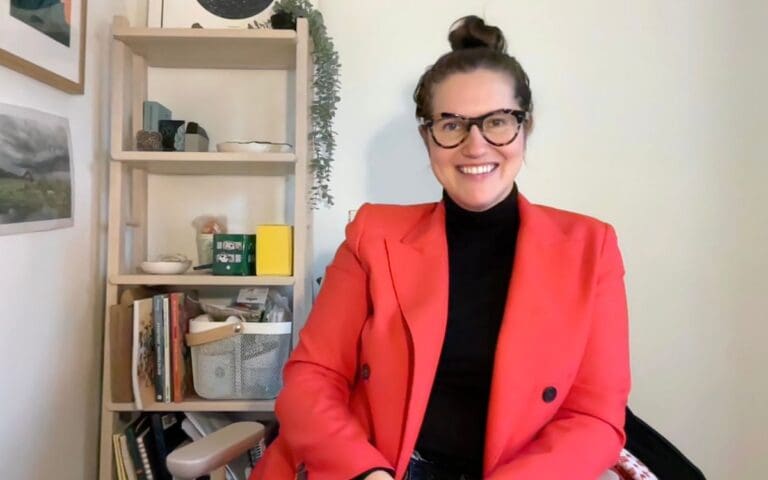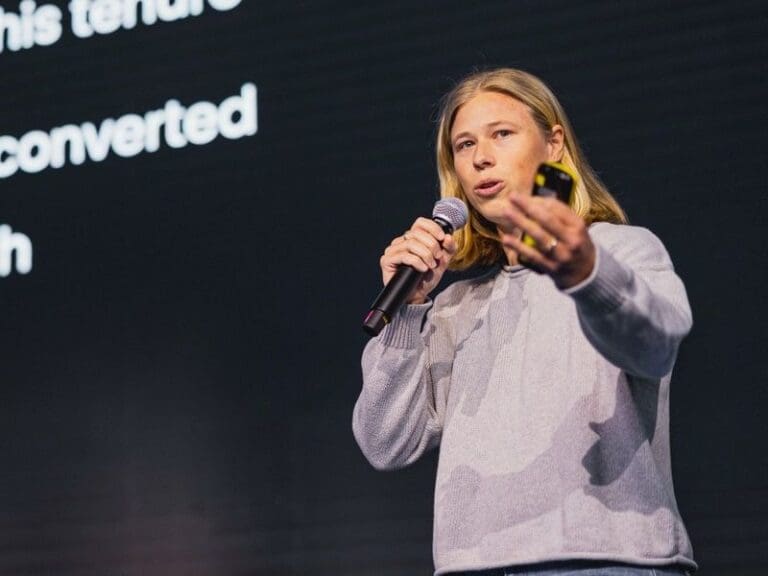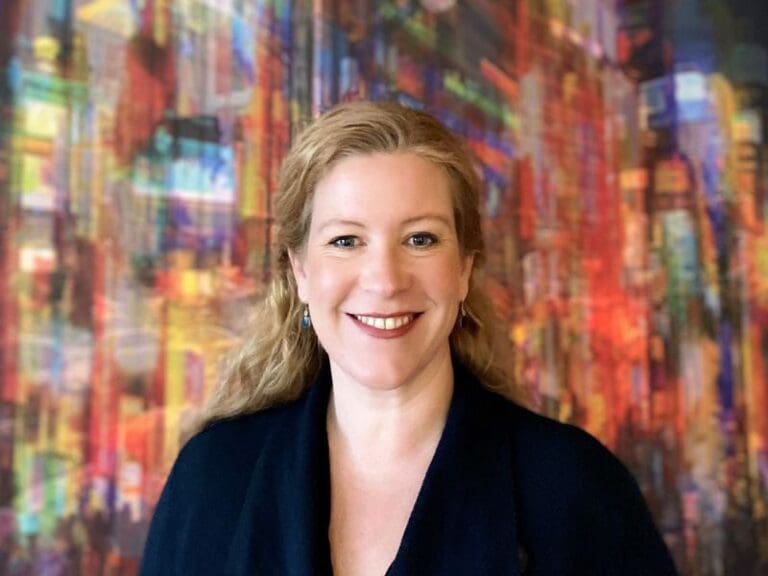Lauren Hendry Parsons is vice president of Communications & Advocacy at ExpressVPN, and co-chair of the VPN Trust Initiative.
A digital rights expert, she helps people understand the importance of digital privacy and security, and she believes that defending online rights and freedoms has never been more critical.
Lauren is also passionate about helping others around her find purpose in what they do and is an active public speaker, mentor, and accredited mediator.
How did you land your current role? Was it planned? What are the key roles in your field of work, and why did you choose your current expertise?
ExpressVPN reached out to me during the COVID lockdowns, at a time when I was ready for my next move. At the time, I was living in Singapore and working in the music technology industry – a role that had been heavily focused on in-person events. When the pandemic hit, the realities of my role shifted, and I wasn’t as fulfilled without those regular personal connections.
Ideally, I wanted my next role to have a positive societal impact, which is why I was immediately drawn to roles in digital rights or sustainability. In both areas, existing regulations don’t adequately address the global challenges we’re facing. When ExpressVPN came along, I saw the opportunity to use my skills to tackle one of the world’s biggest issues – fighting for everyone to have access to a free and open internet.
My career path has been varied—I started in stakeholder and community engagement, then moved into strategic communications and crisis management. From there, I worked in the Australian ABC newsroom and later joined global PR agencies. Now, at ExpressVPN, I draw from all these diverse experiences to shape my approach every day. From GTM strategies, risk management, reputation enhancement and public affairs, communications goes well beyond the traditional bread and butter of public relations, social media, content creation, and employee engagement. It touches all parts of the business and is increasingly a strategic partner to leadership, not just a mouthpiece for the company.
Did you (or do you) have a role model in tech or business in general?
Kim Scott, author of ‘Radical Candor’ and ‘Just Work’. She’s somebody who really embedded the idea into me that you can communicate directly whilst also demonstrating care; feedback is necessary but it’s all in the way you deliver it. I think she has done a lot for people who might not have considered this approach in their communication styles. And personally, I think both books are a fantastic read for anyone!
Australian strategic communications and crisis management leader Kathy Jones is also someone whom I greatly admire and was lucky enough to work with. She is the epitome of a leader, strategist and successful business woman. We only worked together for a year or so, but the trust she put in me and what I learned from her about dealing with complex crises has formed so much of who I am and the way I approach my work.
What are you most proud of in your career, so far?
I approach this in two ways: people and broader impact.
I invest a lot of myself into the teams I’ve built and managed across my roles in Australia, Singapore, and now the UK, so seeing them succeed and grow is incredibly rewarding. I’m also very proud to be entrusted with a dual role at ExpressVPN, serving as both VP of Communications and Advocacy, as well as UK Country Manager, where I lead the culture and development of the London office.
From an impact perspective, I love that working in tech means our actions have global implications. However, this can be a double-edged sword: we have a responsibility to stay aware of global developments and protect people’s digital freedoms. I’m incredibly proud of the direct, positive impact we’ve had in safeguarding digital rights, especially at a time when our digital lives are becoming more public and vulnerable to cyber threats. One example I’m particularly proud of is when I championed the strategic withdrawal of servers from India. In 2022, the Indian government introduced legislation requiring VPN providers to hand over user data if they wanted to operate in the country. Rather than waiting for the enforcement date, ExpressVPN led the industry by withdrawing our servers within 48 hours, which contributed to the Indian government postponing the legislation.
What does an average work day look like for you?
My day is driven by the needs of my team, the wider business, and journalist requests, so it tends to vary from day to day – and that’s how I like it!
Mornings usually start quite intensely with calls to align with Asia. With a globally dispersed team, I believe it’s even more important to stay connected through regular conversations, which often means my mornings are filled with virtual meetings.
I make sure to carve out time to reflect on key actions and review work, ensuring my team receives the feedback and guidance they need. I never want to be a blocker. If my schedule allows, I also enjoy grabbing coffee with one of my UK team members if they’re looking for coaching or mentoring.
Every week, I block out time to connect with journalists. Even though I’m in-house and work with some amazing agencies, one of the reasons I love communications is the opportunity to work directly with journalists and help them develop stories.
Are there any specific skills or traits that you notice companies look for when you’re searching for roles in your field?
Adapting your communication style to suit the person you’re speaking with and their preferences is essential – and it goes beyond just technology. The ability to communicate strategically at a high level is key, as everyone has their own way of expressing themselves, particularly in the workplace. I like to use the analogy of playing catch when discussing communication. Just as you adjust your throwing style depending on who you’re tossing the ball to, the goal is always for the catcher to catch it. It’s also about understanding the situation, the catcher’s mindset, and adjusting accordingly – it’s not about showing off how far or hard you can throw the ball every time.
When hiring, there are three things I personally look for. First, I look for someone who can effectively perform the tasks outlined in the job description. This means having the core competencies required or, if the experience isn’t identical, demonstrating how their skills can be applied to the role.
Second, I seek someone who can hold their own in a room, especially as a woman in a male-dominated field. This involves being confident, knowledgeable in your area of expertise, and able to present and articulate yourself well.
Lastly, personality-wise, I look for adaptability, honesty with oneself and others, strength, and integrity. Ultimately, we’re here to protect our reputation, advance a narrative, and build credibility, so these traits are crucial.
Has anyone ever tried to stop you from learning and developing in your professional life, or have you found the tech sector supportive?
Throughout my career, I’ve been really fortunate to have had extremely supportive managers who were invested in my growth and appreciated who I was. ExpressVPN has allowed me to manage in a way I feel is most effective. To be allowed that freedom and flexibility to develop and harness my managerial skills is something I hugely appreciate and encourage each company to do.
I also give a lot of credit to my first job, which was really the launchpad for my career. I was part of a team which had a range of incredible women, all of whom were invested in my growth at different levels and in different parts of the business, despite it being my first office job, so I was still learning the ropes.
I really do feel like in so many places, I’ve been met with support, and in turn, I try and meet everybody else around me with support as well.
Have you ever faced insecurities and anxieties during your career, and how did you overcome them?
Years ago, I was invited to give a talk to students at a major business school. When I arrived, it was clear that I was the only woman and the most junior person in the room. Immediately, I started comparing myself to others and doubted my experience, given the seniority of the other attendees. However, I paused and asked myself, “What’s unique about me?” and “What can I bring to the conversation that no one else can?”. The truth was, no one knew the business I was there to discuss better than I did, and nobody was going to engage the students as effectively as I could!
I reminded myself that I had valuable knowledge and energy to bring to the room. Rather than undermining my public speaking by doubting my seniority or experience, I focused on what made me different and how I could contribute in a way no one else could. This is a mindset I still use whenever I feel uncertain, and it’s one that can be applied to many situations.
Entering the world of work can be daunting. Do you have any words of advice for anyone feeling overwhelmed?
Acknowledging your achievements: I’d encourage everyone to take a moment to reflect on what they’ve accomplished and how those achievements have brought them to where they are now.
Being well prepared: When you’re well-prepared, know what’s expected of you, and have completed the tasks or actions set out for you, you’ve done everything you can to show up in the best way possible. If you ever find yourself feeling anxious or struggling with imposter syndrome, try writing down the tasks you’ve completed as a reminder of your efforts.
Make your work visible: In a corporate environment, it’s easy to work hard all day and feel overlooked. However, unless your work is visible to others, it won’t have the impact it deserves. Be proactive in sharing the targets you’ve achieved and the actions you’ve taken.
What advice would you give other women wanting to reach their career goals in technology?
I’d encourage everyone to create their own “brag document,” which is essentially a portfolio of your successes to track your progress. It’s important to take a step back and appreciate what you’ve achieved and how far you’ve come. It’s easy to fall into the habit of finishing one project and immediately diving into the next, without pausing to celebrate your efforts and document your accomplishments.







